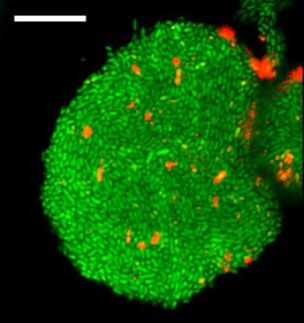Portable AI-based test kit to identify bacterial infections
Dutch scientist selected as a finalist for the Young Inventors Prize 2024: Her startup focuses on the most common types of infection
According to a study published in The Lancet, one in eight global deaths in 2019 was caused by common bacterial infections, which are the second leading cause of death worldwide. Due to slow or ineffective diagnostics many treatments are carried out with limited information on the condition, leading to the overuse of antibiotics - a major concern that Dutch scientist Rochelle Niemeijer seeks to address. She developed a point-of-care test kit that uses artificial intelligence (AI) to quickly identify bacteria causing infections like urinary tract infections, thus enabling for better treatment decisions. Niemeijer is a finalist for the Young Inventors Prize of the European Inventor Award 2024 in recognition of her promising work making diagnostics more accessible and thereby addressing one of the United Nations’ Sustainable Development Goals (SDGs). She was selected from over 550 candidates for this year’s edition.
Leveraging AI for better healthcare
Antimicrobial resistance (AMR) is one of the top global public health and development threats. The World Health Organization (WHO) states that AMR was directly responsible for 1.27 million global deaths in 2019. Inadequate diagnostics - particularly in rural and low-income areas that lack resources and funding - exacerbate the issue, leading to misdiagnosis, unnecessary treatments, and strain on healthcare. Niemeijer’s startup, Nostics, aims to provide doctors with rapid diagnostic tools to enable more effective treatment, starting with one of the most common types of infection globally, urinary tract infections.
Nostics' tool enables quick detection and identification of bacteria. The technology combines a portable spectrometer with artificial intelligence-powered digital software, with a single disposable cartridge that makes sample processing and measurement easy. The invention uses Surface-Enhanced Raman Spectroscopy (SERS) to analyse the samples which has been explored in academic research but not realised in tangible products in the healthcare industry before. The interactions of laser light with the sample generate spectral patterns even when few pathogens are present. A team of AI specialists develops algorithms capable of deciphering these spectral patterns, thereby enabling the accurate identification and classification of various pathogens.
The technology can identify bacterial species within 15 minutes, without the need for expert users or expensive lab infrastructure on a first diagnosis step, making it faster and more convenient than sending the sample to a lab. This technology is versatile and can be adapted different infectious diseases, as it is ideal for conducting screening and profiling in places with limited resources, in the field or during point-of-care tests, as it doesn’t require expert users.
Nostics has raised EUR 10 million to date to build fast, affordable, and data-driven diagnostic tools in the form of a portable platform for doctors. The process relies on a combination of photonics, nanotechnology, and AI.
Aspiring to help others through nanobiology
Niemeijer’s aspiration to help others evolved during her volunteer work at a hospital in Samraong, Cambodia, in 2012, where she faced significant resource shortages and saw the lack of accessible diagnostic tools firsthand. Afterwards she pursued Nanobiology at the Delft University of Technology, where she earned a bachelor’s and master’s degree. In April 2020, she co-founded Nostics and became its Chief Scientific Officer, leveraging nanotechnology, photonics, and machine learning to innovate in diagnostics. Niemeijer said: “We want to make an impact by providing rapid and accessible diagnostic tools. That way, we can make sure that everyone receives the right treatment at the right time”.
By providing diagnostic access to everyone, everywhere, the invention brings efficiency and clarity to patient care, promotes responsible use of germ-fighting medicines, averts the misuse or overuse of antibiotics, and improves disease monitoring, thus contributing to the United Nations’ Sustainable Development Goal (SDG) 3 for good health and well-being.
The young Dutch scientist behind the innovation has been named one of three finalists for the Young Inventors Prize for this year’s European Inventor Award, recognising outstanding European inventors aged under 30 for their inventions. The other finalists are Ukrainian Valentyn Frechka who has developed a method to convert fallen leaves into recyclable paper, reducing deforestation and lowering CO2 emissions and a team of Tunisian inventors, Khaoula Ben Ahmed, Ghofrane Ayari, Souleima Ben Temime, and Sirine Ayari, who have developed a smart wheelchair control solution so individuals with severe disabilities can navigate independently. The winners of the 2024 edition of the European Inventor Award and Young Inventors Prize will be announced during a ceremony livestreamed from Malta on 9 July 2024.
Something is happening in the life science industry ...
This is what true pioneering spirit looks like: Plenty of innovative start-ups are bringing fresh ideas, lifeblood and entrepreneurial spirit to change tomorrow's world for the better. Immerse yourself in the world of these young companies and take the opportunity to get in touch with the founders.
See the theme worlds for related content
Topic world Diagnostics
Diagnostics is at the heart of modern medicine and forms a crucial interface between research and patient care in the biotech and pharmaceutical industries. It not only enables early detection and monitoring of disease, but also plays a central role in individualized medicine by enabling targeted therapies based on an individual's genetic and molecular signature.

Topic world Diagnostics
Diagnostics is at the heart of modern medicine and forms a crucial interface between research and patient care in the biotech and pharmaceutical industries. It not only enables early detection and monitoring of disease, but also plays a central role in individualized medicine by enabling targeted therapies based on an individual's genetic and molecular signature.



























































